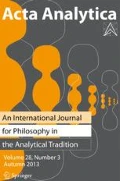Abstract
Davies argues that the ontology of artworks as performances offers a principled way of explaining work-relativity of modality. Object oriented contextualist ontologies of art (Levinson) cannot adequately address the problem of work-relativity of modal properties because they understand looseness in what counts as the same context as a view that slight differences in the work-constitutive features of provenance are work-relative. I argue that it is more in the spirit of contextualism to understand looseness as context-dependent. This points to the general problem—the context of appreciation is not robust enough to ground modal intuitions about objective entities. In general, when epistemology dictates ontology there is always a threat of anti-realism, scepticism and relativism. Davies also appeals to the modality principle—an entity’s essential properties are all and only its constitutive properties. Davies understands essentiality in a traditional way: a property P is an essential property of an object o iff o could not exist and lack P. Kit Fine has recently made a convincing case for the view that the notion of essence is not to be understood in modal terms. I explore some of the implications of this view for Davies’ modal argument for the performance theory.
Similar content being viewed by others
References
Davies, D. 2004: Art as Performance, Oxford, Blackwell.
Enç, B. 1986: “Essentialism without Individual Essences: Causation, Kinds, Supervenience, and Restricted Identities”, Midwest Studies in Philosophy 11: Studies in Essentialism, ed. Peter A. French, Theodore E. Uehling, and Howard K. Wettstein. Minneapolis: University of Minnesota Press: 3–31.
Fine, K. 1994: “Essence and Modality”, Philosophical Perspectives 8: 1–16.
Forbes, G. 1986: “In Defense of Absolute Essentialism”, Midwest Studies in Philosophy 11: Studies in Essentialism, ed. Peter A. French, Theodore E. Uehling, and Howard K. Wettstein. Minneapolis: University of Minnesota Press: 3–31.
Levinson, J. 1990: Music, Art and Metaphysics. Ithaca, NY: Cornell University Press.
Lewis, D. 1986: On the Plurality of Worlds. Oxford: Blackwell.
Matravers, D. 2005: “Two comments and a problem for David Davies’ Performance Theory”, Acta Analytica 20:4, 32–40.
Paul, L. A. 2004: “The Context of Essence”, Australasian Journal of Philosophy 82, 170–184.
Author information
Authors and Affiliations
Rights and permissions
About this article
Cite this article
Šuster, D. The modality principle and work-relativity of modality. Acta Anal 20, 41–52 (2005). https://doi.org/10.1007/s12136-005-1010-6
Received:
Revised:
Issue Date:
DOI: https://doi.org/10.1007/s12136-005-1010-6




